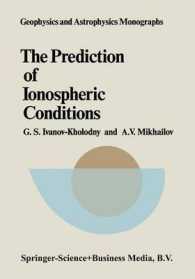Full Description
Navigating the tumultuous waters of cancer treatment and decision making is difficult for all patients. It is also difficult for doctors and other medical personnel. This books deals with a variety of emotion-related and ethics issues that form much of the basis of the world of cancer related medicine: the responsibilities of the physician relative to truth, full disclosure, patient autonomy, death and dying, physician assisted suicide, and suicide in general among cancer patients. These and many other matters are discussed using real stories from the author's extensive personal career in working with cancer patients and their families. This is not a book on treating cancer, but instead is a work that seeks to stimulate a dialog about these issues as well as the spiritual aspects of hope and other factors relating to the plight of cancer patients and their families.
Written for health care professionals and cancer victims and their families alike, the core of the book centers around questions of medical ethics, doctor-patient relationships, decision making during cancer treatment (from medical and patient points of view). Given the emotional commitment and energy level required to work with cancer patients in a moral and ethical manner, medical students and residents will ask themselves: do I really want to be a cancer physician? Can I handle the ups and downs of treating people who may (or may not) be destined to fight and lose the battle against this strong nemesis? How will I answer the tough questions regarding medical approaches to cancer? How will I respond to patients who indicate a desire to commit suicide or request my help in doing so? What can I tell families whose loved one is choosing treatments that will not help and will deteriorate his quality of life? Basing his responses on the Oath of Hippocrates, the author illustrates how adaptable this oath actually is when considering the secular society in which we function.
The Cancer Experience instructs doctors, medical students, and health care workers involved in cancer care on the proper role of medicine, the role of the doctor, and the opportunities for connecting with patients as they help them make decisions regarding treatment and end of life issues. It helps patients understand the issues facing doctors as they assist them, care for them, and try to maintain both close personal relationships but enough emotional and professional distance in order to protect themselves from the stress and strain when medicine fails and patients must face the hardest choices. Here the author promotes a return to traditional medical values that promote closer doctor-patient relationships in an effort to promote trust, civility, and partnership.
Contents
Author's Note on Terminology
Foreword
Acknowledgments
Part I: Intellectual Considerations
Prologue
1- Influences on My Development
2- Why the Book?
3- Protecting What's Good through the Educational Process: Capitalizing on the Gene Pool
4- Oncology Is Not for the Emotionally Stingy
5- Hope
6- Finding New Purpose after Enduring the Cancer Olympics
7- Changing Times, Changing Methods, Unchanging Mission
8- Seeking Functionality within a Moral Framework
9- A Practical Adaptation of the Original Oath in Search for Modern Relevance
10- Death and Dying: Natural and Otherwise
11- Suicide: Patient Conceived, Planned, and Consummated
Part II: Interacting with Cancer Patients and Their Families
12- Informal Physician-Patient Communication
13- Patient Confidentiality and Special Patient Circumstances
14- Essentials of Communication Skills: Listening, Hearing, Reading Body Language
15- Gaining the Patient's Confidence
16- The Cancer Specialist as a Teacher of the Patient and Family: The Lead-Up to Treatment
17- The Physician as an Educator after Treatment: Using the Cancer as a Tool
18- The Journey from the Referring Doctor to the Oncologist: Uncertainty, Anxiety, and Hope along the Way 125
19- More on Physician Leadership: Being in Charge
20- Influences on Cancer Patients' Attitudes and Receptiveness
21- Communication When There Is Still Optimism for Cure
22- Communication Once Treatment Failure Is Obvious
23- Hospice Care
24- Facing Death and Dying with the Patient
Epilogue
Notes
Bibliography
Index
About the Author







